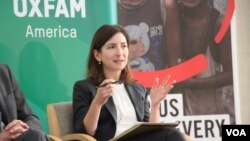Donors should shift funding practices towards placing more decision-making in the hands of local authorities and base donor development on local demand, a recent report by major charities have said in a new report.
Oxfam and Save the Children issued the report, titled “The Power of Ownership: Transforming US Foreign Assistance”, which discusses USAID and Millennium Challenge Corporation projects in Ghana, Indonesia, Jordan and Rwanda, on November 9.
U.S. Democratic Representative for California Barbara Lee and Republican Representative Richard G. Lugar said in a statement: “US foreign assistance is most effective when provided in a manner that ensures local participation and ownership”.
This approach can be implemented by aligning with country priorities, using the country’s financial systems, creating a direct financial relationship with local organizations, and pursuing a range of participatory and consultative strategies, the report notes.
“The evidence of ownership is really on sustainability,” said Bonaria Siahaan, executive director of the Millennium Challenge Account, Indonesia.
US foreign assistance provides dividends in the form of enhanced U.S. national security and economic prosperity with only less than 1 percent of the total US federal budget, the report said.
“Why is development important from the US government perspective internationally? It is important because it benefits our long term security
interests, our own prosperity,” said Tony Pipa, chief strategy officer, USAID.
“It is not conceivable that a country can change its policy or suddenly has good governance over infrastructure, suddenly has good structure and place to maintain the type of thing that was built by donors without ownership,” said Beth Tritter, vice president of the Department of Policy and Evaluation, MCC.
The report also discussed the uncertainty over the future of bipartisanship under Donald Trump.
However, John Kelenzi, executive director of the African Evangelistic Enterprise Rwanda, is optimistic.
“It is too early to say whether the next administration is going to affect the funds we are getting or not because, particularly in the developed world, it is not just an individual who decides this. There is a system, policy, and the press.”
“We are being positive because Americans have made their choice, and we have to appreciate the decision they have made, and we believe that the incoming administration is going to sustain what was introduced by the previous administration and the outgoing administration,” he added.









